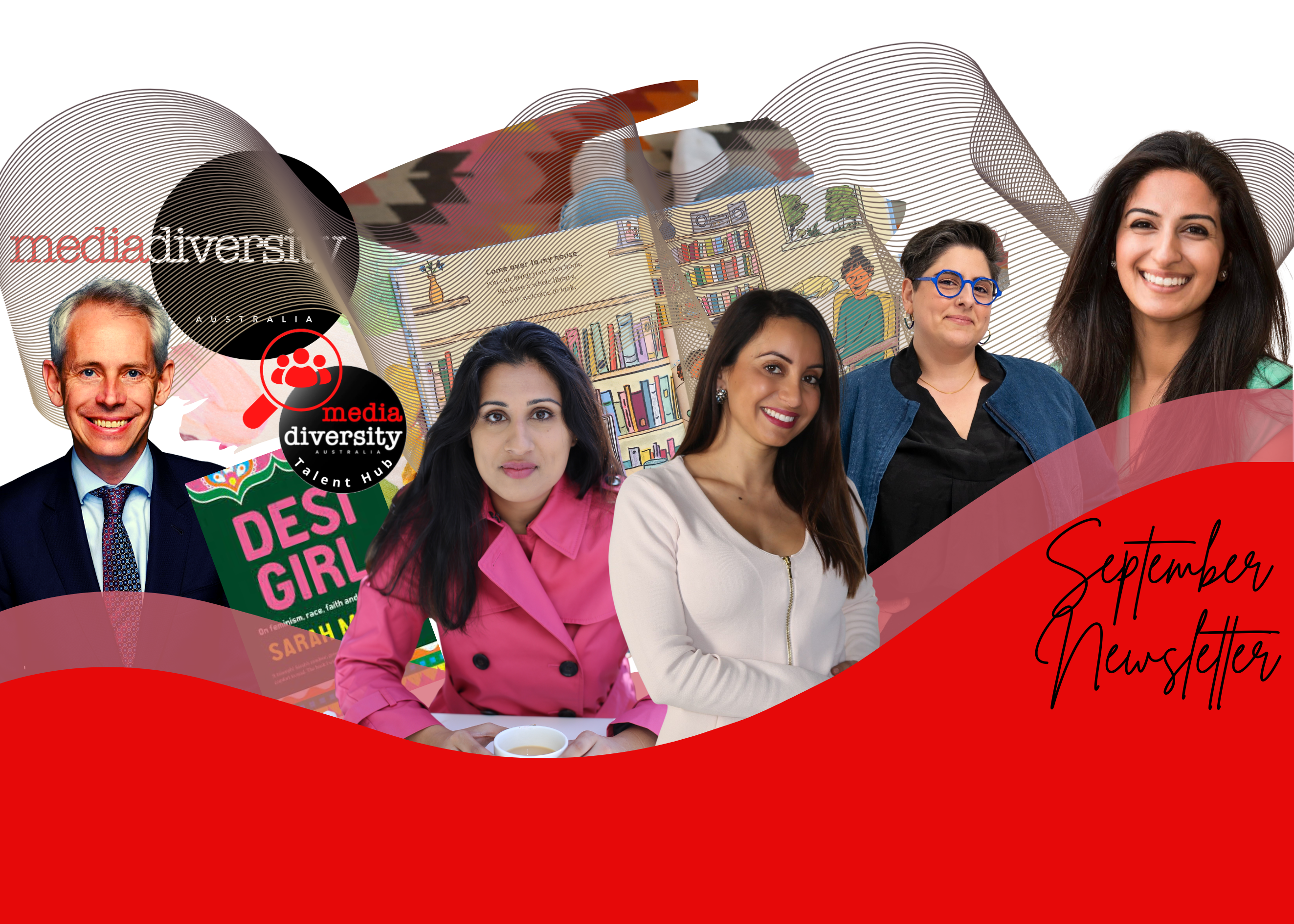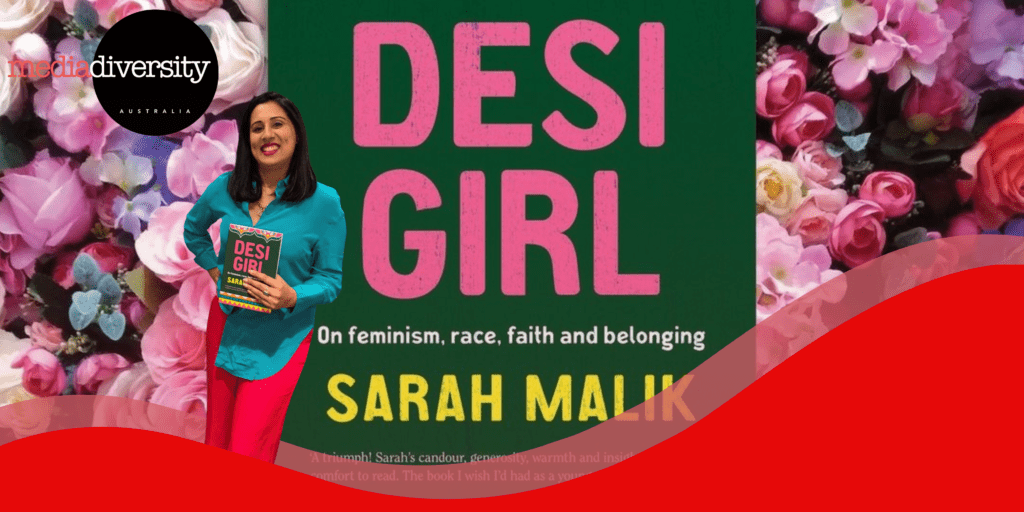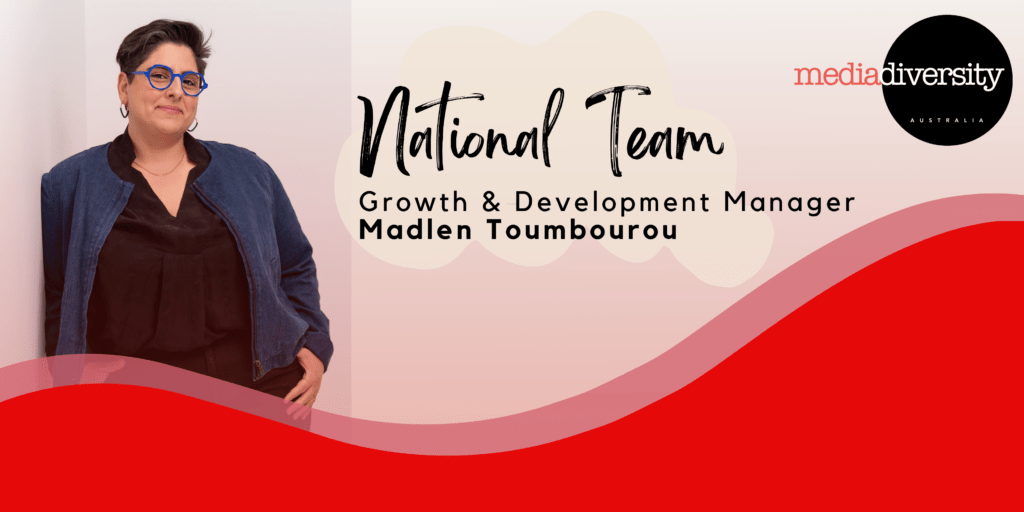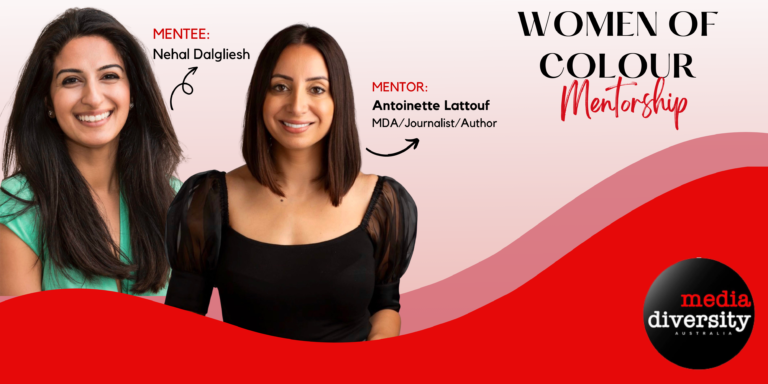Hi MDA supporters,
In this month’s newsletter we put the spotlight on award-winning investigative journalist and author of ‘Desi Girl’, Sarah Malik. We are thrilled to launch our TalentHub portal which connects diverse journalists and communications professionals with media employers. Speaking of launching, join our upcoming ACT Chapter launch hosted by the Hon Multicultural Minister Andrew Giles MP on Tuesday, 27 September at 6pm and hear from some of Canberra’s finest journalists. As the scope of MDA’s work grows, so does our team! We welcome the newest addition to our national team, Madlen Toumbourou, as she takes on the role of Growth and Development Manager. Our year long Women of Colour mentorships are well underway, get to know our first mentee, Nehal Dalgliesh as she shares insights from her mentoring sessions with broadcaster, author and co-founder of MDA, Antoinette Lattouf. We’ve partnered with RMIT to host a panel discussion chaired by ABC RN Breakfast host Patricia Karvelas to discuss industry challenges, diversity and the future of journalism. And finally, journalist and disability advocate Eliza Hull and best-selling children’s author Sally Rippin have released a ground-breaking picture book, Come Over to My House that celebrates the home-lives of Deaf and disabled families.


This book is a collection of memoir stories about everything from learning to ocean swim as an adult, uncovering family’s past, about my relationship with travel, reading, work, money, therapy, wellness, loving Jane Austen, buying a first home, language, moving out of home, and figuring out my identity as someone whose parent were immigrants.
Race and feminism are the lens with which I view the world, so a lot of these everyday stories are told through the lens – what does it mean to be a particular kind of person navigating certain spaces, told with a lot of humour and love. Immigration, gender and race are all themes that have animated me in my work and journalism. To explore how they have shaped my own life and turn that gaze on myself was the next step from writing about other people.
At a core level the book is about searching for yourself and finding yourself and I think it will resonate with any person who is trying to do that whatever background you are from. For me it was accelerated by being a young Muslim woman in a post 9/11 world, where who are you suddenly is in the media spotlight in really grotesque and caricatured ways; and that almost forced a process of inward reflection that was a gift in a way.
I loved storytelling but often the politics of the newsroom embodied the very inequalities we were trying to highlight – from class, gender and race.
Recently, I feel like Diversity and Inclusion have been co-opted, highly corporatized, liability-saving terms devoid of their original meaning; creating an industry where those who profit from it are sometimes white people and people of colour serve as talent or tokenistic faces. What is more important to me is representation and equality, of ensuring there are not only 10 interns of colour, but that there are also behind the scenes leaders of colour in media and arts organisations changing culture at the highest level and involved in decision making and in the highest pay brackets.Change does not happen gracefully but forcibly and it’s important that the needle keeps shifting so change is not surface level but structural.
This book is about finding yourself and knowing that the things that make you different are not liabilities, they can be strengths and the source of your greatest power. Sometimes when you are made to feel inferior or excluded because of your difference, you are forced to go through windows, explore the roof and the attic and the basements; it gives you a perspective that others don’t always have and that is valuable. I want young journalists of colour to know that if you are finding it challenging, progressing or even getting started, don’t gaslight or berate yourself.
I hope that my contribution opens the space for different kinds of stories to occupy the mainstream and it normalises them and makes people feel seen and it also interrogates the way in which we inhabit space is impacted by who we are and makes that more explicit. I had this huge fear that by talking about some of my negative experiences in the media would jeopardise my career opportunities, and I would be seen as a whinger? Particularly looking at my interaction with white liberal progressives/spaces where racism plays out in much more subtle ways; where you are easily replaced by a more amenable person of colour that can paper over racial dynamics in the workplace, if you complain too loudly. I think so many of us silence ourselves out of fear. But naming those experiences is so powerful because you realise there are common threads with others and you start to see a pattern emerge that is bigger than you as an individual. I think making that discrimination invisible that is exactly how the status quo continues. Change is uncomfortable but it begins by sharing our stories and by claiming space. It’s not always an equal playing field and we need to identify these things to make structural changes to ensure our work spaces are more inclusive.
Sarah Malik is the author of the memoir Desi Girl: On feminism, race, faith and belonging (UQP)
Here is the booktopia link for Desi Girl


Introducing our TalentHub, a first of its kind, growing pool of diverse talent with multi-level media expertise. MDA’s TalentHub connects diverse journalists and communications professionals with job opportunities and helps hirers find suitable candidates.
Are you interested in seeking opportunities in the Media industry? Register in our Talent Hub NOW!
For more information on our TalentHub visit MDA’s website:
Since Media Diversity Australia’s launch in 2017, we have introduced state-based chapters in NSW, VIC and QLD. We are pleased to be expanding to the ACT where our ACT Chapter will be run by local journalists, key policy makers and media and communications professionals!
The ACT launch will be hosted by Hon Andrew Giles MP, Minister for Multiculturalism who will also deliver a keynote speech, followed by a panel discussion led by some of Canberra’s finest journalists and commentators including Nour Haydar (ABC), Julia Kanapathippillai (Canberra Star, News Corp), Dr Liz Allen (ANU & Phillip Coorey (AFR).
This must-attend event will be held on Tuesday, 27 September at 6pm at the Australian National University in Canberra.
Get a chance to meet our CEO, Mariam Veiszadeh and hear about MDA’s exciting new membership offering for media, educational and industry partners.
This free event is open to current and aspiring journalists from across commercial, public broadcasting and community/ethnic media, as well as media academics, industry partners and key policy makers.
Want to attend MDA’s ACT launch?

As the scope of our work grows, so does our team!
Introducing the newest addition to MDA’s national team our Growth and Development Manager, Madlen Toumbourou.
Madlen is a dynamic leader, strategist, storyteller, and project manager in the not-for-profit sector.
With a background in Psychology, Business Development, and Operations Management, Madlen’s breadth of experience includes supporting individuals on their mental health recovery journey, to building thriving team culture, to management of national tenders. She’s also an award-winning chef.
She’s known for bringing diverse stakeholders together to tackle complex challenges, and using structure to help enliven solution-focussed thinking.
We are delighted to welcome you to the team Madlen!

My favourite part about working with Antoinette is seeing how her incredible mind works. There’s a reason she can conquer a million things at once: she’s indomitable, confident, understands that being uncomfortable is the only path to growth, has a knack for taking something that may seem insurmountable and breaking it down so it’s completely achievable… and she’s super organised!
There are so many multicultural women in the Australian media I admire, but the one who has always stood out to me is Yumi Stynes. Long before most of us were talking about diversity, Yumi was breaking barriers in the media landscape. She knows exactly who she is and what she believes in. She is always herself and doesn’t try to fit in with any expectations of who she should be. I love her fearlessness and her resilience, and having worked with her briefly, I know first hand that she has an incredibly kind spirit.
I’ve always been one of only a handful of women of colour in the room, sometimes the entire network. But MDA is changing that. They’re creating opportunities, a sense of community and support. They’re ensuring our voices are heard and our perspectives are shared. How amazing that generations of people will grow up with diversity being the norm rather than the exception?
So, you want to be a journalist? Challenges, diversity, and the future — Panel event
We’ve partnered with RMIT to host a lively panel discussion chaired by ABC RN Breakfast host (and RMIT Journalism alumni) Patricia Karvelas to discuss industry challenges, diversity and the future of journalism.
The panelists include award-winning journalist currently working as the social affairs and inequality editor at Guardian Australia, Luke Henriques-Gomes; co-chair of MDA’s Victoria Chapter Zena Chamas, who is also a journalist, filmmaker and documentary producer plus Melbourne-based writer and frequent commentator on Australian politics and media, Tim Dulop.
Journalist & Disability advocate Eliza Hull and best-selling children’s author Sally Rippin have together created Come Over to My House, a joyful and inclusive story that features positive representations of families with a variety of disabilities, and all the ways their homes have been adapted to be more accessible and fun!
Come Over to My House features a family with dwarfism, an Autistic father and child, a mother who is blind and more, the book uses delightful rhyming text and stunning illustrations to follow each child through their home.
The purpose of the book is to spotlight positive and authentic representation of families that are disabled, and illustrated with joy and energy by Daniel Gray-Barnett. Both Eliza and Sally hope that disabled young people and families see themselves represented within its pages, sending a powerful message of inclusion.
The poignant children’s book, Come Over to My House is a must-read for families, and is available online and in all good bookstores.
As a not-for-profit organisation, we rely on the help of our incredible volunteers. With your financial and volunteer support, we can continue to run programs to support culturally and linguistically diverse journalists, conduct agenda-setting research, run networking events, provide practical solutions for the media industry, and much more. If you would like to make a tax-deductible donation to support the vital work we do, please click here.
Media Diversity Australia (MDA) is a national not-for-profit organisation led by journalists and media professionals. Australia is culturally and linguistically diverse, and our media should be too. Established in 2017, MDA has a unique role as a champion of cultural diversity in Australian journalism and news media. We have a vision for a media industry with full and equal participation for culturally diverse people at all levels.